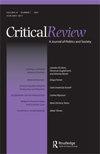Laclau’s New Postmodern Radicalism: Politics, Democracy, and the Epistemology of Certainty
IF 1.7
3区 社会学
Q4 POLITICAL SCIENCE
引用次数: 0
Abstract
ABSTRACT A timeless critique holds that the radical is animated by a deep sense of certainty that leads to the worst excesses. By distinguishing essentialist and non-essentialist forms of radicalism, Ernesto Laclau offers a “coalitional” form of radicalism that, in effect, responds to this critique. Laclau deconstructs classical forms of radicalism, such as Marxism, to show how one can use some of their formal components, such as dichotomic rhetoric and a notion of utopia, without assuming that their particular content (e.g., the figure of the proletarian or the socialist utopia) entails the permanent abolition of oppression. Laclau’s radicalism enables political actors to build their own radical front by politicizing and creating linkages between issues. Laclau thus avoids the epistemic certainty of classical radicalisms. However, in the interest of politically effective radicalism, he deploys a localized form of certainty that has an ambivalent potential for intolerance and violence.拉克劳的新后现代激进主义:政治、民主与确定性认识论
摘要一种永恒的批判认为,激进派被一种深刻的确定感所激励,这种确定感会导致最严重的过度行为。通过区分本质主义和非本质主义形式的激进主义,埃内斯托·拉克劳提供了一种“联盟”形式的激进主义,实际上是对这种批评的回应。拉克劳解构了激进主义的经典形式,如马克思主义,以表明人们如何使用它们的一些形式组成部分,如二分法修辞和乌托邦概念,而不假设它们的特定内容(如无产阶级或社会主义乌托邦的形象)意味着永久废除压迫。拉克劳的激进主义使政治行动者能够通过政治化和在问题之间建立联系来建立自己的激进阵线。因此,拉克劳避免了古典激进主义的认识确定性。然而,为了政治上有效的激进主义,他采用了一种局部的确定形式,这种形式具有不容忍和暴力的矛盾潜力。
本文章由计算机程序翻译,如有差异,请以英文原文为准。
求助全文
约1分钟内获得全文
求助全文
来源期刊

Critical Review
POLITICAL SCIENCE-
CiteScore
1.30
自引率
12.50%
发文量
17
期刊介绍:
Critical Review: A Journal of Politics and Society is a political-science journal dedicated to advancing political theory with an epistemological bent. Recurrent questions discussed in our pages include: How can political actors know what they need to know to effect positive social change? What are the sources of political actors’ beliefs? Are these sources reliable? Critical Review is the only journal in which the ideational determinants of political behavior are investigated empirically as well as being assessed for their normative implications. Thus, while normative political theorists are the main contributors to Critical Review, we also publish scholarship on the realities of public opinion, the media, technocratic decision making, ideological reasoning, and other empirical phenomena.
 求助内容:
求助内容: 应助结果提醒方式:
应助结果提醒方式:


